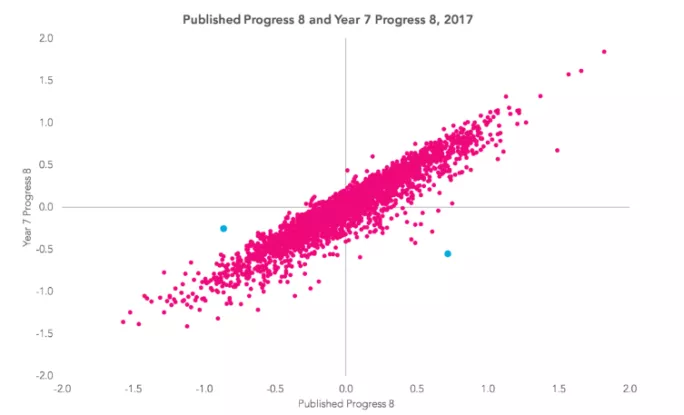Schools that have taken on pupils in need of a school place have “severely damaged” their Progress 8 score in the process, new research shows.
Education Datalab has looked at the impact on a school’s Progress 8 score if pupils are included who left before January of Year 11. This group is currently excluded from official calculations of the score.
The research follows concerns that some schools remove pupils prior to Year 11 in order to boost their score under the accountability measure.
Under the current system, Progress 8 is calculated for pupils who have reached the end of key stage 4 in state schools.
Everybody else - including those who move into pupil-referral units or alternative provision, those who are home-educated and those who fall out of the system entirely - is excluded.
In the analysis, Education Datalab identified all pupils who were assessed at the end of key stage 2 in 2011-12 and who were on the roll of a state-funded mainstream school in January 2013.
The progress of these pupils was reported for the school they were attending at this point in Year 7, regardless of where they completed KS4.
A total of 516,000 pupils were covered by the analysis, of which almost 483,000 (93 per cent) were included in the national Progress 8 calculations in 2017.
Schools ‘penalised for doing the right thing’
Of the remaining 7 per cent, almost 7,000 pupils completed KS4 at a state-funded PRU, 4,000 moved to state-funded establishments which admit at age 14 (studio schools, UTCs and some FE colleges) and another 4,000 moved into the independent sector (including independent alternative provision).
The destinations of almost 17,000 young people are recorded as unknown and these are likely to include those in home schooling and who have emigrated.
Education Datalab then produced an “alternative” Progress 8 score based on the Year 7 cohort.
While many schools had similar scores because their pupil population had not changed much, the analysis revealed “some large changes for individual schools” where “there is a lot of movement off, or on to, the school roll”.
One school (the blue dot on the right) retained just a third of the pupils on roll in Year 7 in January 2013 all the way to the end of KS4. This meant that its published Progress 8 score was over 0.5, whereas its alternative Progress 8 score was -0.5.
Another school (the left blue dot) saw its Progress 8 score increase to just below the coasting standard (-0.25) under the alternative methodology.
Its official score was well below the floor standard (-0.5).
At this school, over a quarter of the pupils counted in the published Progress 8 measure were recruited between Year 7 and Year 11 - a group of pupils with a Progress 8 score of -1.7.
“In other words, doing the right thing and taking on pupils in need of a school place has severely damaged the school’s Progress 8 measure,” the researchers note.
Education Datalab said its alternative measure could be produced to “sit alongside” the main Progress 8 measure.
Dave Thomson, chief statistician at Datalab’s parent company FFT, said: “Its main weakness is that schools end up being accountable for pupils for whom they are not responsible.
“While this might be acceptable in the case of exclusions and managed moves, it might be less acceptable in the case of pupils who move for reasons beyond a school’s control, including those who leave the country altogether.”
However, he said that if the figures were provided alongside “data on movements on and off the school roll” it could “provide a more rounded view of the attainment of all pupils who had been on a school’s books”.





